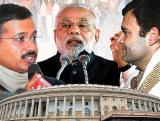
"Coalition politics will almost certainly dominate Indian governance. Since the 1984 national elections, no party has won a clear majority in the lower house of Parliament.
"We judge that this trend will continue with the 2014 election, and the proliferation of political parties will further complicate political consensus building," said James Clapper, Director of US National Intelligence.
In this election year in particular, coalition politics and institutional challenges will remain the primary drivers of India's economic and foreign policy decision making, he said while testifying before the Senate Select Committee on Intelligence.
"Any future government installed after the 2014 election will probably have a positive view of the US, but future legislation or policy changes that are consistent with US interests is not assured," Clapper said.
"In 2014, India will probably attain a 5 per cent average annual growth rate, significantly less than the 8 per cent growth that it achieved from 2005 to 2012 and that is needed to achieve its policy goals," he said.
Besides, Clapper said India shares American objectives for a stable and democratic Pakistan that can encourage trade and economic integration between South and Central Asia.






Comments
Add new comment